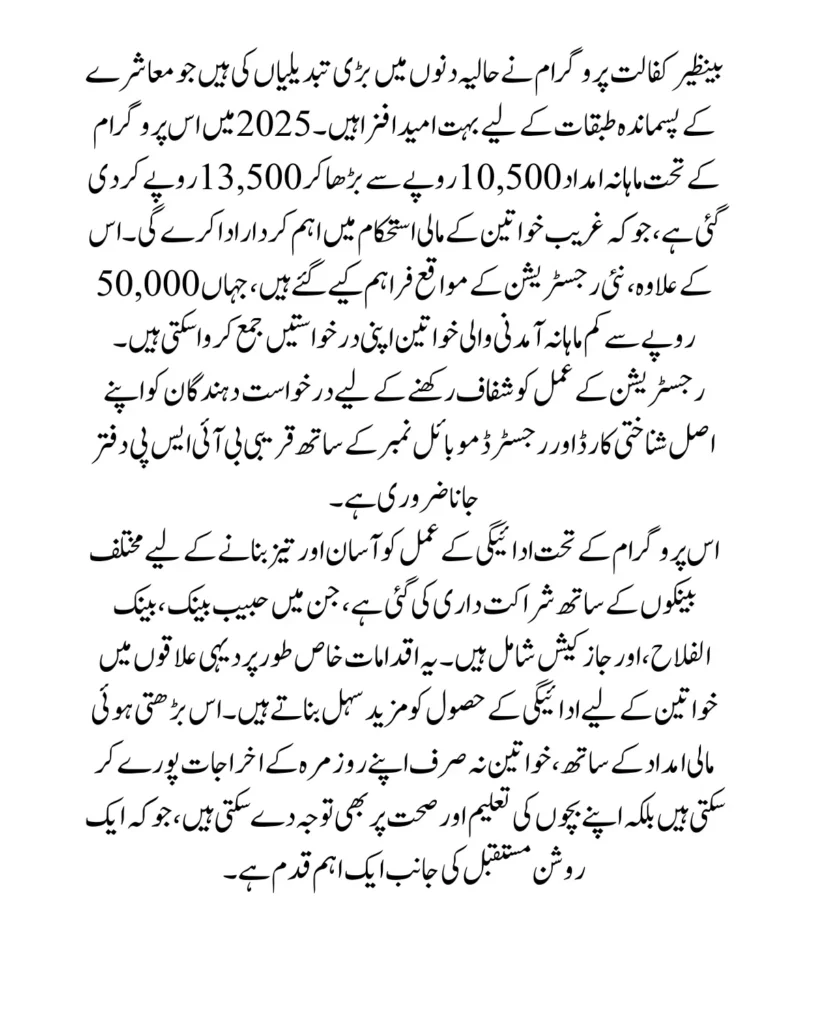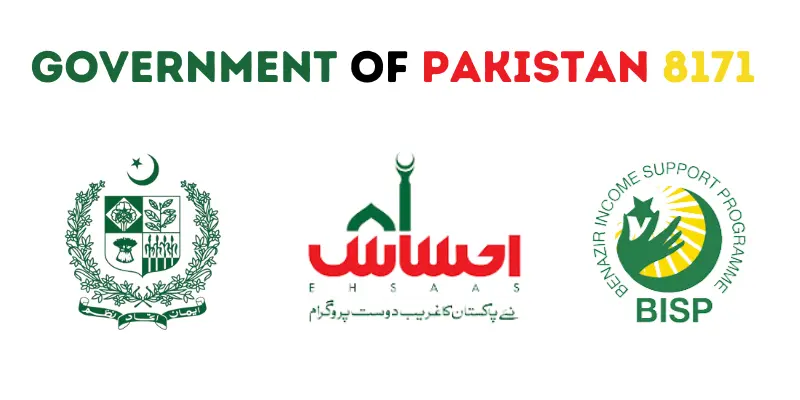Benazir Kafalat Program Payment Increase
Benazir Kafalat Program Payment Increase stands as a beacon of hope for millions of underprivileged women in Pakistan. As the largest cash transfer initiative in the country’s history, it is designed to provide much-needed financial relief while fostering long-term economic stability. This program not only addresses immediate needs such as rising food prices but also aims to empower women, enabling them to play a significant role in combating poverty.
Benazir Kafaalat 10500 Installment Phase 3: Complete Guide to Eligibility, Payment, and Registration
Recently, the program witnessed a significant development: an increase in quarterly stipends from Rs. 10,500 to Rs. 13,500, effective January 2025. This decision, announced by BISP chairperson Senator Rubina Khalid, is a step forward in the government’s commitment to uplift marginalized communities. Alongside this increase, measures such as expanded registration and enhanced payment withdrawal options have been introduced, making the program more accessible and impactful for beneficiaries. Let’s dive deeper into these updates to understand their implications and benefits.
Purpose and Goals of the Benazir Kafalat Program
The Benazir Kafalat Program is a cornerstone of Pakistan’s social welfare initiatives, targeting women from economically vulnerable families. It is designed with both short- and long-term goals in mind. In the short term, the program helps cushion the blow of inflation and economic stagnation. Rising costs of essentials like food and fuel disproportionately affect low-income families, and this financial assistance provides a safety net against such economic shocks.
Benazir Kafalat Program Double Stipend of 10500 Starts in December 2024
On the other hand, the long-term vision of the program is to empower women by making them financially independent. By providing consistent financial support, the program enables women to contribute to their household income and decision-making processes. This empowerment is not just financial but also social, as it allows women to access education and healthcare for their families, thus breaking the cycle of poverty. In essence, the Benazir Kafalat Program is not just a monetary aid program; it is a tool for transformative change, ensuring that underprivileged women can build a better future for themselves and their families.

Details of the Payment Increase
One of the most anticipated updates to the Benazir Kafalat Program is the increase in quarterly payments from Rs. 10,500 to Rs. 13,500. This Rs. 3,000 hike comes as a response to growing economic challenges faced by low-income families across Pakistan. According to Senator Rubina Khalid, this increase will be implemented starting from January 2025, marking a significant enhancement in the program’s support framework.
For beneficiaries currently receiving payments, it is important to note that the increase does not apply to the December 2024 installment. Those payments will remain at Rs. 10,500. However, from the first quarter of 2025 onward, eligible women can expect to receive the updated amount. This increase is not just a monetary adjustment; it reflects the government’s dedication to improving the living standards of women who are most affected by inflation and economic downturns.
No Need To Verfiy Fingerprint For Benazir Kafalaat Payment 13500 Get In Bank Account in 2025 January
This boost in payments ensures that families have more resources to meet their basic needs. Whether it’s buying food, paying for children’s education, or covering medical expenses, the increased stipend provides a stronger safety net. Such proactive measures not only address immediate financial pressures but also contribute to long-term economic resilience among Pakistan’s most vulnerable populations.
New Registration Process: Expanding Accessibility
With the announcement of the payment increase, the Benazir Kafalat Program has also opened new avenues for registration. Recognizing the rising poverty levels and inflation in the country, the program now invites more women to join its ranks. Eligibility criteria remain straightforward: women living below the poverty line with a monthly income of less than Rs. 50,000 can apply.
To facilitate this process, BISP has set up registration centers across its offices nationwide. This ensures that women from all regions, urban and rural, can access these services. However, it’s essential for applicants to bring their original CNIC and a mobile phone number registered in their name. This mobile number is critical as it will be used for updates and SMS alerts about payments.
A key point to note is that there is currently no online option for registration. All interested women must visit their nearest BISP office in person to complete the process. While this may seem inconvenient to some, the in-person registration ensures accuracy and reduces the risk of fraud or errors. By expanding registration opportunities, the program aims to reach more deserving families, further solidifying its role as a lifeline for Pakistan’s underprivileged women.
Expanded Payment Withdrawal Options
To make the payment process more efficient, the Benazir Income Support Program has partnered with additional banks. Previously, beneficiaries could withdraw their payments only through Habib Bank Limited (HBL). While HBL remains a key partner, women can now also access their funds through Bank Al Falah, Bank of Punjab, Mobilink Microfinance (JazzCash), Telenor Microfinance Bank, and HBL Microfinance.
BISP 8171 Payment System Bank Account for 13500 Installment
This expansion addresses a common grievance: long queues and delays at limited bank branches. With more withdrawal options available, beneficiaries can now choose the bank or financial service that is most convenient for them. This not only reduces waiting times but also ensures faster access to funds, especially for women in rural areas where banking infrastructure is sparse.
Such measures underscore BISP’s commitment to streamlining the payment process. By leveraging partnerships with multiple financial institutions, the program ensures that every woman receives her stipend without unnecessary delays or hardships. These changes are not just logistical improvements; they reflect a deeper understanding of the challenges faced by beneficiaries and a willingness to address them effectively.
Conclusion
The increase in Benazir Kafalat Program payments from Rs. 10,500 to Rs. 13,500 is more than just a financial adjustment it is a lifeline for millions of underprivileged women. Coupled with the expansion of registration processes and payment withdrawal options, these updates signify a comprehensive approach to addressing poverty and empowering women in Pakistan.
By providing consistent financial support, the program not only mitigates the immediate impacts of inflation but also fosters long-term economic resilience. Women now have greater opportunities to invest in their families’ futures, whether through education, healthcare, or small-scale enterprises.
As these changes take effect, it is crucial for eligible women to update their information, complete their registration, and take full advantage of the enhanced benefits. The Benazir Kafalat Program remains a shining example of how targeted social welfare initiatives can transform lives, paving the way for a more equitable and prosperous Pakistan.

